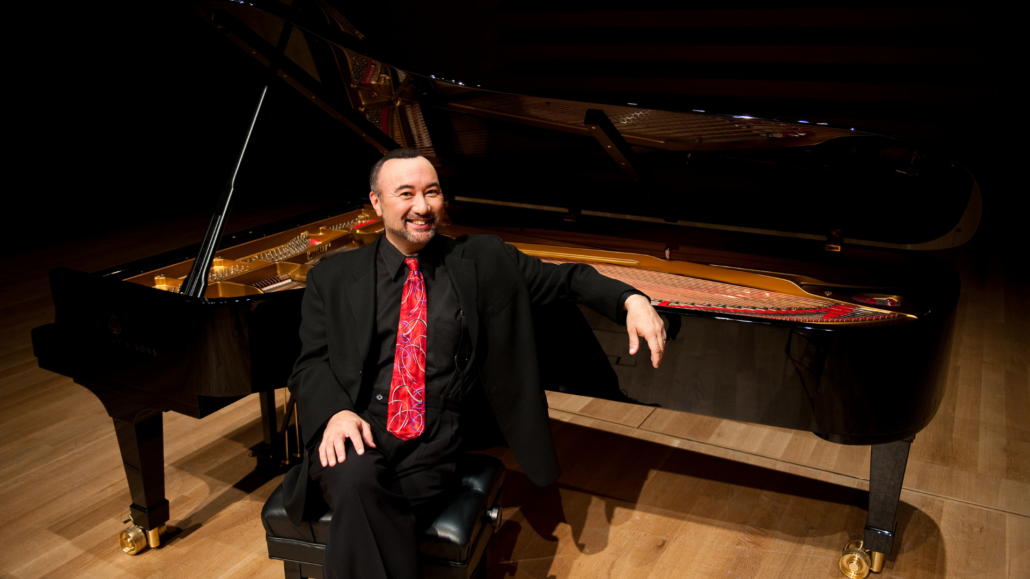PARKER – BEETHOVEN’S EMPEROR CONCERTO
“Let me tell you a story,” says Jon Kimura Parker from his Houston, Texas home, to which he’s just returned after performing all five of Ludwig van Beethoven’s piano concertos with Symphony Nova Scotia.
“It happens to include the “Emperor” concerto, but it’s mostly about the power of music,” he continues. “In 1995, specifically in mid-November of 1995, the Dayton Agreement was signed, outlining a peace settlement after several years of the Bosnian war. I know that it doesn’t sound very much like it’s related to Beethoven, but I got a phone call just a couple of days before Christmas from a representative of an American relief organization called AmeriCares. I had met this guy before: he was on the board of a couple of orchestras I had played with, he was a big music fan, and he just thought I would be possibly willing to go along with his suggestion.”
The suggestion? That AmeriCares would fly Kimura Parker to Sarajevo to play Beethoven’s “Emperor” concerto, otherwise known as the Piano Concerto No. 5 in E-flat major for the weary citizens of the Bosnian capital—on New Year’s Eve.
“It meant flying over on a C-130 military transport plane—and, I mean, it was a surreal experience,” the pianist explains. “We arrived on December 29 and it wasn’t until we’d gotten into an armoured vehicle and been dropped off at the hotel that I realized that I’d never shown anybody a passport, as we were considered part of a diplomatic mission. Of course, the concert hall had been damaged in the war and there was no heat, which was a bit of a problem. It was very cold, but I played the concerto with the Sarajevo Philharmonic, who had not played together in many years. And after the concert, a very old Bosnian woman who was a life-long resident of Sarajevo came backstage, found our translator, and really wanted to talk to me. So they found me, and she said ‘I want you to know that while you played the slow movement of the concerto, I realized that I had forgotten about the war.’
“That’s all she wanted to say. I didn’t know how to reply to that, but I thanked her, and she walked away. But then I thought ‘That is the most perfect example of what music can mean and what music can do!’ And it happened with that piece of music, which is especially important to think about, because the piece is grand on so many levels.”
It’s also somewhat ironic. The popular conception of the Concerto No. 5 is that it is about sacrifice and valour, and that it somehow glorifies war. No less a critic than Alfred Einstein, the acknowledged arbiter of musical taste in the first half of the 20th century, considered it “the apotheosis of the military concept”. But in this instance, the great musicologist was flat wrong. At the time it was written, Beethoven was spending his nights in his brother’s basement, pillows over his ears to block out the cannons of the French army, then besieging Vienna. Music was his escape from war, not his celebration of conflict, and he implies as much in the concerto’s opening movement.
“A piano concerto normally starts with the orchestra showing everybody what the main themes are going to be, and then finally the pianist enters and does the same thing,” Kimura Parker explains. “But this concerto starts with a big chord from the orchestra and then a piano cadenza, then another chord and another cadenza, and a third chord and another cadenza. Only then does the orchestra start showing everybody what all the themes are going to be.”
It’s a prime example of Beethoven playing with form, as the pianist notes, but it’s also a way of prioritizing the individual, as opposed to the regimented forces of the orchestra. “Beethoven was becoming more and more the Romantic artist in a Classical age,” Kimura Parker says. “The Romantic artist—Robert Schumann being a very good example—was so much about the individual and their own feelings. But you’re right: Beethoven wrote this when he was actually surrounded by the sounds of war, and horrified by it. But it’s a little hard to say; I think you can make conjecture in any number of different directions about it.”
This we know: the “Emperor” tag wasn’t Beethoven’s idea, although in its rare combination of consoling beauty and technical challenge, No. 5 can be seen as the king of all piano concertos. Monarchists hoping for royal airs are better off looking to this program’s Emperor Waltz. It was written by Johann Strauss II and dedicated to the Austro-Hungarian emperor Franz Josef I. (In a further irony, he was the monarch who presided over the Austro-Hungarian annexation of Bosnia and Herzegovina in 1908. That act set the stage for a lengthy conflict and, eventually, all-out war in the 1990s). In a further royal connection, Brazilian-Canadian composer Maria-Eduarda Mendes Martins’ Vortex Cantabilis is essentially a co-creation with a long-dead king, based as it is on a 13th-century chant penned by Alfonso X of Castile, whose songcraft has weathered the vagaries of time better than his statecraft. And then, for balance, there are the sturdy Slovakian folk melodies of Zoltán Kodály’s Dances of Galánta. Jazz is said to be the most democratic of the musical arts, but this program suggests that classical music has room for all.
Notes by Alex Varty




 Jon Kimura Parker, piano
Jon Kimura Parker, piano